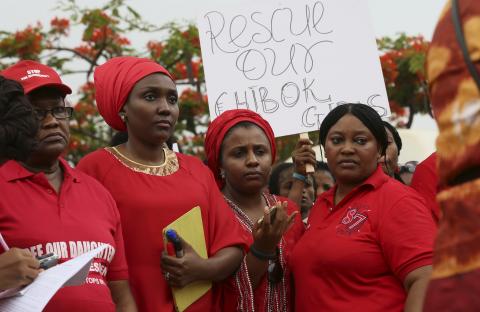Advertisement
Protesters Urge Nigeria To Step Up Hunt For Girls Abducted By Islamists
ABUJA/MAIDUGURI (Reuters) - Dozens of protesters gathered outside Nigeria's parliament on Wednesday called on security forces to search harder for 200 schoolgirls abducted by Islamist militants in the war-ravaged northeast over two weeks ago.
Scores of suspected Boko Haram gunmen stormed an all-girls secondary school in the village of Chibok, in Borno state, on April 14, packing the teenagers onto trucks and disappearing into a remote, hilly area along the Cameroon border.
The demonstrators, including pregnant women, relatives of the girls and civil servants, waved banners saying "Bring Back Our Girls", the sombre mood of their rally accentuated by torrential rain that drenched everyone.
"If 230 girls can go missing for this long and nobody knows how to find them, then something's very wrong with our country," said Tokumbo Adebanjo, 45, a travel agent and mother.
"I feel the pain of those other mothers. Obviously the government are not doing their job."
Boko Haram rebels have killed thousands in the past year.
The scale and brutality of the school attack shocked a nation already long used to hearing about atrocities in an increasingly bloody, five-year-old Islamist insurgency.
The abduction has also become a symbol of the military's impotence in protecting civilians against Islamist insurgents whose attacks appear to be getting less discriminating.
President Goodluck Jonathan has said security forces are doing all they can to find the girls, aged between 15 and 18.
"All the girls must be brought back alive in the shortest time possible and only then will we believe them," Lawan Aban, a lawyer, who has two nieces and a sister missing.
"We have lost faith in the Nigerian authorities."
The demonstrators began their march outside the Hilton Abuja, one of Africa's most expensive hotels, where in a week's time Nigeria will be hosting the World Economic Forum (WEF) under tight security, to be maintained by 6,000 soldiers.
BOMB ATTACK IN ABUJA ON SAME DAY
On the day the schoolgirls were seized, a bomb blast also blamed on Boko Haram killed 75 people on the edge of the capital Abuja, the first attack on the city in two years.
"The Chibok community has been wiped out by Boko Haram," Tsambido Hosea, whose daughter is among the kidnapped, said at the gates of the national assembly. "We are in agony."
Britain's foreign office confirmed on Tuesday it had offered support to Nigeria to help find the girls, but gave no details of what it might do - or whether the offer had been accepted.
Boko Haram's struggle to revive a medieval Islamic caliphate in the north has become the main security threat to Africa's top energy producer and threatens to overshadow its investor appeal as a dynamic economy, now Africa's biggest, and consumer market.
"There is no doubt our nation is at war," Senate President David Mark told parliament on Tuesday, calling for Nigerians to unite against the Islamists.
As speculation about the girls' whereabouts grew, Senator Ahmad Zannah from Borno state said in parliament on Tuesday that the girls had been taken as "wives" by Boko Haram commanders - a grim echo of Uganda's Lord's Resistance Army, which abducted thousands of girls from central Africa for the same purpose.
A military source involved in the hunt for the girls said they were believed to be in the Sambisa forest, a known Boko Haram base. Halilu Chibok, whose daughter is among the rebels, said his wife cried all the time and could no longer eat after hearing her daughter may have been married to a militant.
"Why can't the government invite other countries to help?" the chairman of the school's parents association, Dumona Mpur, said by telephone from Chibok, which he said was half-deserted.
"If the world can search for a missing Malaysian (airliner), why can't the president ask them to help look for these children?"



















Add new comment